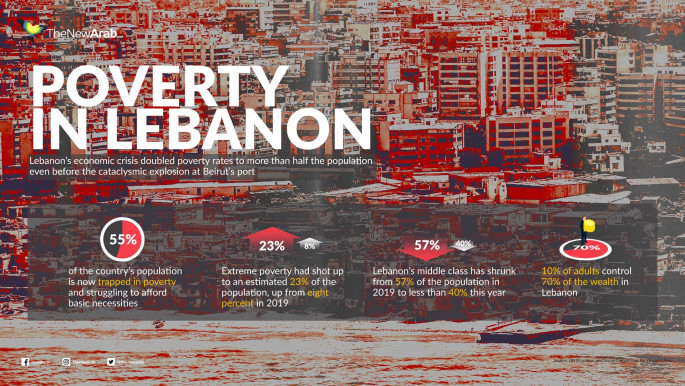Lebanon on verge of not being able to feed itself, UK minister warns
James Cleverly, UK foreign office minister for the Middle East, described Lebanon's financial crisis as a "man-made problem which could have been prevented".
"The most pressing danger is the risk to food security: Lebanon is on the verge of not being able to feed itself," the minister said, after meeting with Lebanese officials in Beirut on Thursday.
Lebanon has faced a worsening economic crisis over the past year, with a rapidly depreciating currency and rising poverty, compounded by the coronavirus pandemic and August's devestating port blast.
The Beirut explosion, which killed more than 200 people, caused billions of dollars of infrastructural damage and made around 300,000 homeless.
"Four months on from the blast, Lebanon is threatened by a silent tsunami. Lebanon's leaders must act," Cleverly said.
Fears of an end to subsidies on basic goods have raised worries about food shortages.
Lebanon's central bank says it can only support another two months of subsidies, and Prime Minister Hassan Diab has said that lifting them without a clear plan will cause a "social explosion".
Officials, both from the central bank and Lebanon's ruling elite, have been widely blamed for the spiralling economic crisis.
 |
| [Click to enlarge] |
Cleverly on Thursday joined an international chorus calling for the government to "do what is needed and deliver reforms".
"The alternative will be horrific," he said.
Cleverly's comments come after French President Emmanuel Macron reitirated his demand for Lebanese politicians to form a government amid the crisis.
Formation of a reform-minded government was the first step in a French plan towards unlocking massive financial aid to rescue the country from its worst economic crisis in decades.
"The commitments... have not been respected," Macron said, at an international conference for humanitarian aid attended by foreign and international donors, as well as Lebanese non-governmental organisations.
"Lack of political consensus on national priorities severely impedes Lebanon's ability to implement long-term and visionary development policies," said Saroj Kumar Jha, World Bank regional director, who also called for the swift formation of a government.
The fall 2020 edition of the Lebanon Economic Monitor predicted the economy will have contracted by 19.2 percent this year and projected a debt-to-GDP ratio of 194 percent next year.
Agencies contributed to this report
Follow us on Facebook, Twitter and Instagram to stay connected





 Follow the Middle East's top stories in English at The New Arab on Google News
Follow the Middle East's top stories in English at The New Arab on Google News


